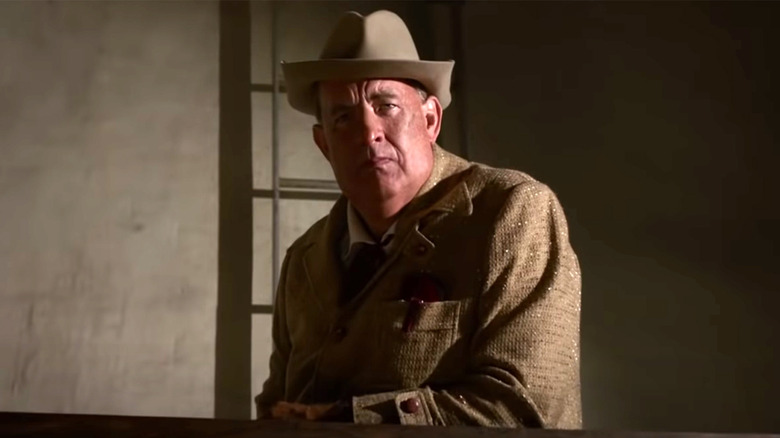The Reason Baz Luhrmann Didn't Make Elvis The Main Character Of His Own Movie
In Baz Luhrmann's "Elvis," a hyper-charged impressionistic version of the life of Elvis Presley, Tom Hanks plays the notorious Colonel Tom Parker (né Andreas Cornelis van Kuijk) as a conniving, Mephistophelean, Sidney Greenstreet-like figure, constantly lurking in the background, happily exploiting Elvis for every penny he was worth. That Hanks gives him an implacable, extraterrestrial accent aids in his depiction as a semi-supernatural supervillain. Parker, Elvis' manager for the vast bulk of the singer's career, was the one who turned Elvis into a brand, expanding him from a mere artist and dangerous punk/rockabilly sex symbol into a household-safe product. The Colonel narrates Luhrmann's film, arguing that his 50% take of Elvis' earnings was completely fair, and that his exploitative instincts were a means to make a buck from the love the world already held for Presley.
One shouldn't expect historical accuracy from the filmmaker who brought us the gaudy and insufferable "Moulin Rouge!," so it's fair to point out that a lot of vital details of Elvis' life have been fudged, or simply left out of Luhrmann's biopic. One could also argue, however, that "Elvis" is a classic use of an Unreliable Narrator, with the Colonel sugarcoating some of the details of his own life, all while still acknowledging that he can easily be seen as the villain in Elvis' own story.
Why not make Elvis the narrator of his own story, though? Why a controversial figure like the Colonel? In an interview on the podcast "Afternoons with Deborah Knight," Luhrmann reveals that he saw a near-Shakespearean relationship between the two men, and found it to be reminiscent of one of his favorite movies: Miloš Forman's 1984 film "Amadeus."
Are You Lonesome Tonight?
On the podcast, Luhrmann makes an important distinction between his film and traditional Hollywood biopics, notably that his is not so much a biography as it is an historical portrait. To extend the Shakespearean parallel, one does not do to the Bard's "Richard III" for an accurate portrayal of the historical Richard III. When asked what drew him to Elvis, Luhrmann admits it was the legend more than the man:
"Well, it's more that I thought — it doesn't do a biopic so much as – Shakespeare will take a historical figure and make a big idea. And I was such a fan of 'Amadeus,' you know? And 'Amadeus' is not really about Mozart, it's actually the story of Salieri. Now, who knows who he is? Well, who knows who Colonel Tom Parker is? Colonel Tom Parker, played by Tom Hanks. And, you know, his point of view. 'How much percentage did you get of Elvis' income?' He says: 'How much percentage did Elvis get of my income?' You know what I mean?"
The closest Shakespearean analogue may be the tragedy "Coriolanus," about a capable, violent general who is, because of his battlefield reputation, asked to become a politician. Coriolanus, completely unfamiliar with politics or the etiquette therein, proceeds to foul up all the senators' plans. One might see Elvis as being the put-upon general, asked to be a brand-friendly face rather than an artist. Luhrmann looked at that dynamic, and wanted to see what the politicians had to say:
"[Parker is] the great seller and the snake oil salesman and the carny, who sees this kid growing up in the Black community, and the effect he has on audiences. And he goes, 'That's the best carnival act I've ever seen.'"
Snake oil
Luhrmann discussed additional Shakespearean influences with the Radio Times, acknowledging the Bard's habit of taking historical figures and completely rewriting history in order to make a more salient political point, or to simply tell a better story. "Elvis" is, in his words, "[t]he way Shakespeare takes historical figures and makes a bigger point." Luhrmann continued:
"I knew a bit about Parker. But a few years ago, when there were a lot of 'them,' you know, the idea of these guys that would be quite proud about telling ... I guess you call them lies. But really like, big, toxic positive lies — Carnival selling. Well, you put that next to Elvis, who's this incredibly vulnerable kid who grows up in one of the few white houses in the Black community. Like Eminem."
In fact, Baz Luhrmann's "Elvis," like "Venom" before it, features a biographical rap song over its credits performed by Eminem. The song is called "The King and I." Luhrmann continued about modern snake oil salesmanship, saying that it "just seems to speak to right now, the tension between the carnival selling, the hucksterism, the snake oil bit, and then the vulnerable and the pure and honest." Could Luhrmann be making a reference to a certain American political figure known for deceptive salesman language and hucksterism? He doesn't mention Trump by name.
Sympathy for the Colonel
Elvis Presley died back in 1977 at the age of 42. His rock 'n' roll heyday was in the 1950s. In the 2020s, Elvis is celebrated more as an image — a cultural Hummel figurine — than as a human being, and Luhrmann was sensitive to that. There aren't too many modern teenagers dying to know the story of a musician who was popular when their grandparents were teens. In an interview with IndieWire, Luhrmann aimed to memorialize Elvis, while humanizing the Colonel as a balance. Is the Colonel the bad guy in this old story? Luhrmann explained:
"We don't make the Colonel just the bad guy. The Colonel is going to argue that from his point of view, all he was doing was facilitating your love for Elvis. It's a paradox. We're not making a judgment about him, it's up to the audience to decide what they think about the Colonel. He's not easy to love. The court of public opinion decided he was fleecing Elvis."
What the Colonel did, and this is dramatized in the film, was keep Elvis prisoner at the International Hotel in Las Vegas, turning what was meant to be a six-week engagement into a five-year contract that left the King dangerously exhausted and increasingly reliant on drugs. The Colonel took his 50% and gambled it away in various Vegas hotels. He's certainly not a sympathetic figure, but Luhrmann does ensure that the audience understands his perspective as a business-first-humanity-second kind of guy.
"Elvis" opens in theaters on June 24, 2022.



